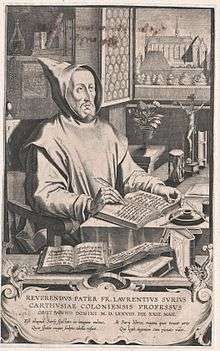Laurentius Surius
Laurentius Surius (translating to Lorenz Sauer; Lübeck, 1523 – Cologne, 23 May 1578) was a German Carthusian hagiographer and church historian.

Biography
Laurentius Surius was born in Lübeck in 1523.[1] It is not certain whether his parents were Catholics or Lutherans. According to a remark made by Peter Canisius ("Epistolæ", ed. Braunsberger, I, 36), he was born a Protestant and was brought into the Catholic Church by Canisius. Surius studied at the universities of Frankfort-on-the-Oder and Cologne. In the latter university Peter Canisius was a fellow-student. Surius also met there Johannes Justus Lansperger, who induced him to enter the Carthusian monastery at Cologne, in 1542.
The greater part of his life after this was spent in his monastery, where he was a model of piety, of rigid observance of the rules of the order, and of earnest work as a scholar; for these reasons he was held in high esteem by St. Pius V.
Surius died at Cologne May 25, 1578.
Works
He devoted himself chiefly to the domains of church history and hagiography, and wrote a large number of works on these subjects.
He also translated many works into Latin, mainly ascetic and theological texts. Among these translations should be mentioned writings by Johannes Tauler, Henry Suso, John of Ruysbroeck, Johannes Gropper's work on the reality of Christ's Flesh and Blood, the sermons of Michael Sidonius, the apologies of Friedrich Staphylus, and an oration by Martin Eisengrein.
He completed the Institutiones of Florentius of Haarlem, prior of the Carthusians of Louvain, and edited a new edition of the Homiliarium of Charlemagne.
He wrote against Sleidanus his "Commentarius brevis rerum in orbe gestarum ab a. 1500 ad a. 1564" (Cologne, 1566), which was continued by others.
He was also the author of a collection of the Acts of the councils: "Concilia omnia tum generalia tum provincialia" (4 volumes, Cologne, 1567).[2]
Hagiography
His most important and still valuable work is his collection of the lives of the saints, De probatis Sanctorum historiis ab Al. Lipomano olim conscriptis nunc primum a Laur. Surio emendatis et auctis, the first edition of which appeared in six volumes at Cologne in 1570-75. He began a second edition which was finished after his death by his colleague in the monastery, Mosander, who added a seventh volume (Cologne, 1582). A third edition with an improved text appeared at Cologne in 1618; a new and revised edition was published (1875–80) at Turin in thirteen volumes. Surius did not want learning, but was willing to give credit to fabulous accounts.[2] Notwithstanding the liberties taken by Surius with the text of the manuscripts he used, his work has rendered great service and has furnished many narratives concerning the lives of the saints that have been published in various languages.
Notes
- Soldatjenkova, Tatjana and Waegemans, Emmanuel. East is East, Peeters Publishers, 2003 ISBN 9789042912984
- Chalmers, Alexander. "Surius, Laurentius", General Biographical Dictionary, 1812
Sources
